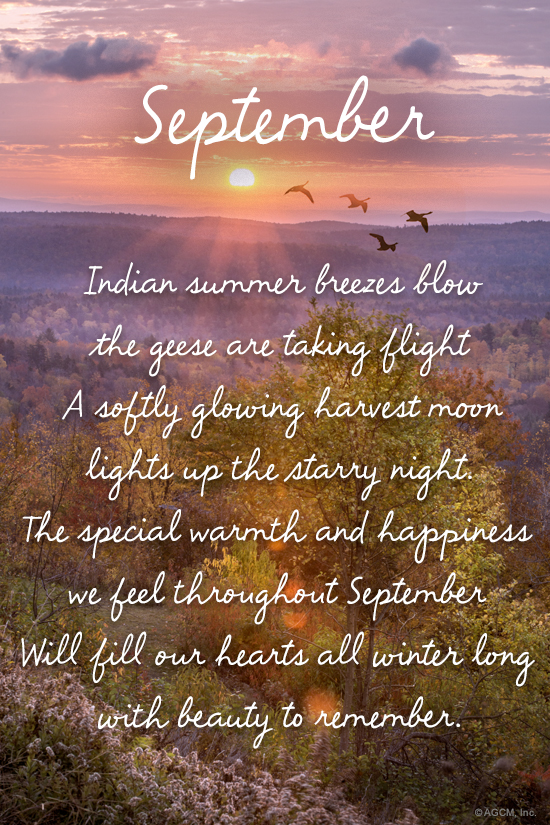
Poem for September: A Symphony of Words
In the tapestry of literary masterpieces, "Poem for September" stands as an enigmatic and evocative work of art. Its ethereal lines, lyrical cadence, and profound imagery have captivated readers and critics alike, leaving an enduring mark on the annals of poetry.
Understanding the Essence of "Poem for September"
"Poem for September" is an ode to the month of transition, a time when summer’s warmth gives way to autumn’s embrace. The poem explores the fleeting nature of time, the cycle of life and death, and the bittersweet beauty of change.
Its author, J.R. Ackerley, weaves together a tapestry of rich metaphors and sensory experiences, capturing the essence of September through its sights, sounds, scents, and emotions. The poem’s evocative language creates a vivid and immersive world that transports the reader into the very heart of the season.
Suitable Writing Styles for "Poem for September"
The diverse themes and imagery of "Poem for September" lend themselves to a wide range of writing styles. Here are some suitable options:
- Lyric Poetry: A lyrical poem emphasizes the expression of personal emotions and experiences through vivid imagery and musicality.
- Free Verse Poetry: This style allows for greater freedom in structure and rhyme scheme, enabling poets to explore complex ideas and emotions in a more fluid manner.
- Nature Poetry: Poems that focus on the beauty, wonder, and rhythms of the natural world can effectively capture the essence of September’s transition.
- Elegy: An elegy mourns the loss of something precious, and it can be a suitable style for expressing the bittersweet nature of time passing.
Poetic Explorations of "Poem for September"
Now, let us delve into the realm of poetic creation, exploring various interpretations of the "Poem for September" theme:
- Ode to Autumn’s Embrace:
As summer’s vibrant hues cede to amber’s grip,
And leaves of autumn dance in nature’s stage,
September whispers tales of change with tip,
A season’s journey, a poignant page.
- Elegy for the Dying Year:
O, September, time’s relentless tide,
You bear the weight of seasons’ parting ways,
As withered flowers mourn their summer pride,
A poignant elegy for dying days.
- A Symphony of Nature’s Grace:
September’s breeze, a symphony of sound,
Rustling leaves in nature’s gentle dance,
A chorus of birdsong, sweet and profound,
A testament to life’s enduring trance.
- An Ode to Change and Transformation:
Through autumn’s golden glow, we witness change,
A transformation, old replaced by new,
In nature’s constant, ever-flowing range,
A reminder that life’s tapestry is true.
Tips for Writing Poems on "Poem for September"
- Observe the beauty and nuances of the season: Pay close attention to the changes in nature, the colors, scents, and sounds of September.
- Employ vivid imagery and sensory language: Use words that evoke the senses, creating a tangible and immersive experience for the reader.
- Explore the themes of time, change, and mortality: Reflect on the fleeting nature of time and the cycle of life and death.
- Seek inspiration from other poets: Read works by poets such as Ackerley, Keats, and Frost who have written extensively on autumn and the passing of seasons.
Reading Good Poems:
- Engage with the poem on multiple levels: Analyze the language, imagery, and structure.
- Consider the poet’s intention and the emotions they are trying to convey.
- Pay attention to the rhythm, flow, and musicality of the poem.
Questions and Answers
- What is the main theme of "Poem for September"?
Transition, change, time, and the cycle of life and death. - What is the tone of the poem?
Bittersweet, contemplative, and reflective. - How does the poet use imagery to convey the essence of September?
Through descriptions of changing colors, falling leaves, and the sounds and scents of the season.
Conclusion
Dear reader, we bid you farewell with a heartfelt plea: respect the art of poetry. Do not plagiarize the work of others; instead, give credit where it is due. Let us cultivate a culture of sharing and appreciation, knowing that the true magic of poetry lies in its ability to touch our hearts and inspire our souls.
